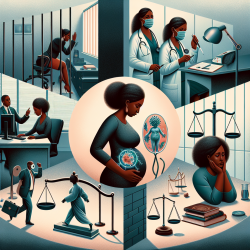In today's diverse work environment, understanding the unique challenges faced by different groups is crucial for practitioners aiming to provide effective support. The research article titled “‘Oh gosh, why go?’ cause they are going to look at me and not hire”: intersectional experiences of black women navigating employment during pregnancy and parenting” sheds light on the multifaceted issues Black women encounter in the workplace during pregnancy and parenting. This blog post will explore key findings from the study and offer guidance on how practitioners can apply these insights to improve their practice.
The Intersectional Framework
The study uses an intersectional framework to analyze how race, gender, pregnancy, and socioeconomic status intersect to create unique challenges for Black women in the workplace. This approach highlights the compounded discrimination these women face, which can lead to significant stress and financial insecurity.
Key Themes from the Research
- "You're a liability": Many participants reported difficulty seeking employment during pregnancy due to perceived liability by employers.
- "This is not working": Experiences of discrimination and bias while employed, including lack of accommodations and support.
- "It's really depressing. I wanna work": The stress and mental health impact of experiencing discrimination and bias.
Implications for Practitioners
Practitioners working with pregnant or parenting Black women should consider these intersectional challenges when providing support. Here are some ways to implement the research findings:
Advocate for Inclusive Policies
Encourage workplaces to adopt family-friendly policies that accommodate pregnant employees. Highlight the importance of legal compliance with acts such as the Pregnancy Discrimination Act and advocate for universal paid leave policies.
Create Supportive Environments
Work towards creating a supportive environment where Black women feel safe disclosing their pregnancies without fear of discrimination. This includes providing resources and referrals to legal aid if needed.
Mental Health Support
Recognize the mental health implications of workplace discrimination. Offer counseling services or refer clients to mental health professionals who understand the intersectionality of race, gender, and pregnancy.
Encourage Further Research
The study highlights a need for more research into the specific experiences of Black pregnant women in the workplace. Practitioners can contribute by documenting case studies or partnering with researchers to gather more data.
Conclusion
The insights from this research underscore the importance of understanding intersectionality in addressing workplace discrimination against Black pregnant women. By implementing these findings, practitioners can better support their clients in navigating these challenges.
To read the original research paper, please follow this link: “‘Oh gosh, why go?’ cause they are going to look at me and not hire”: intersectional experiences of black women navigating employment during pregnancy and parenting.










